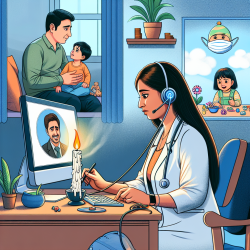Introduction
The Family Integrated Care (FICare) model is revolutionizing neonatal intensive care units (NICUs) by actively involving parents in the care of their infants. This approach is backed by a cluster randomized controlled trial conducted in Canada and Australia, which highlights its potential benefits for both infants and parents. This blog post explores how practitioners can implement the FICare model to improve outcomes for infants and reduce parental stress and anxiety.
Understanding the FICare Model
Traditionally, NICUs have been environments where healthcare professionals provide the majority of care, with parents playing a supportive role. The FICare model shifts this dynamic by empowering parents to provide all but the most advanced medical care for their infants, with support from the medical team. This approach aims to enhance parent-infant interaction, which is crucial for the infant's development and the parents' confidence in caring for their child post-discharge.
Research Outcomes
The study, "Evaluation of the Family Integrated Care model of neonatal intensive care: a cluster randomized controlled trial in Canada and Australia," provides compelling evidence for the efficacy of the FICare model. Key findings include:
- Infants in the FICare group experienced greater weight gain compared to those receiving standard NICU care.
- There was a significant increase in breastfeeding rates at discharge among FICare participants.
- Parental stress and anxiety levels were significantly reduced, as measured by validated scales.
These outcomes suggest that the FICare model not only benefits the physical health of infants but also supports the emotional well-being of parents.
Implementing FICare in Practice
For practitioners looking to implement FICare, the following steps are recommended:
- Education and Training: Train NICU staff, including nurses and physicians, on the principles of FICare. This includes re-conceptualizing the role of healthcare providers as facilitators of parental involvement.
- Parental Support: Develop a comprehensive parent education program that includes information on infant care, coping strategies, and preparation for discharge.
- Peer Support: Establish a network of veteran parents who can provide peer-to-peer support to new parents in the NICU.
- Infrastructure Adaptation: Modify NICU policies and facilities to accommodate and encourage extended parental presence and participation.
Encouraging Further Research
While the FICare model shows promising results, further research is necessary to explore its long-term effects and potential applications in other areas of healthcare. Practitioners are encouraged to engage in research initiatives that assess the feasibility and efficacy of FICare in different contexts, such as more acutely ill infants or other healthcare settings.
Conclusion
The FICare model represents a paradigm shift in neonatal care, emphasizing the importance of parental involvement in improving infant outcomes and reducing parental stress. By implementing this model, practitioners can contribute to a more holistic and effective approach to neonatal care.
To read the original research paper, please follow this link: Evaluation of the Family Integrated Care model of neonatal intensive care: a cluster randomized controlled trial in Canada and Australia.










